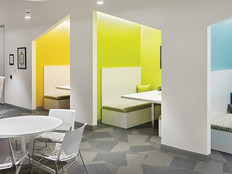How Toccoa Falls College Delivers A Picture-Perfect Technology Experience
Nestled in the foothills of the Appalachian Mountains, Toccoa Falls College (TFC) has long provided an idyllic, picturesque background where students can bond with nature. And now — thanks to a complete network renovation last year — the college is also delivering a picture-perfect technology experience.
“We quite literally overhauled everything,” reports Michael Musick, director of client support at TFC. “It’s been a real benefit to the entire campus.”
The college, which offers 27 majors and 40 minors within three schools, dramatically sped up its network by adding 30 core switches, as well as significantly bolstered wireless coverage by installing nearly 100 wireless access points (APs) throughout the campus.
“Before only the dorms had wireless, and it was kind of spotty coverage,” Musick acknowledges. “Now the entire campus — every building — as well as the three major outdoor areas all have wireless access.”
The transformation has not gone unnoticed by the school’s 750 students.
“The biggest benefit is that now when I'm outside on campus, I can get wireless,” reveals Rebecca Dawson, a sophomore majoring in Cross-Cultural Adult Education. “Toccoa is a very active campus; on the weekends if the weather is nice and I'm not out hiking, I like to study outside in a field or in my hammock. Previously I could only take book work outside,” she says. “Now I can complete my online assignments outside, too.”
Indeed, TFC’s Earl Field — a popular hangout area where students regularly erect hammocks and throw blankets down — was one of the main areas targeted for wireless coverage.
“We saw students out there all the time with their laptops but no Internet,” Musick recalls. “Now they can check their classes, go on Facebook, and do all kinds of other things.”
The $300,000 upgrade was largely motivated by a desire to facilitate a seamless technology experience for students, according to Musick. “They are paying for a great service and we want to give them a great service,” he explains.
Even more, industry analysts say TFC’s improvements represent a critical step in properly equipping students for their professional futures.
“Given the amount of consumerization going on in the workforce today — and the number of students who already have tablets, laptops and smartphones — it only makes sense that universities need to offer the benefits of faster speeds and wireless,” points out Rob Ayoub, research director, Frost & Sullivan. “You want students to be absolutely comfortable with the latest technology as they enter the workforce and ‘wireless everywhere’ will ensure that happens.
“We see increased wireless deployments in a variety of enterprise environments — healthcare, financial services, retail, etc.,” Ayoub continues. “I believe that creating a competitive workforce that is comfortable working in an always-on environment needs to be built at the university level.”
Getting Started
TFC first began contemplating the upgrade a couple of years ago after ongoing battles with a sluggish network. “We were noticing a real bottleneck with our equipment,” Musick explains.
The college’s network traffic jam could be attributed, in large part, to a 20-megabit Internet pipe that was supporting approximately 1,000 student and faculty connections — often with seven or eight offices sharing a single connection.
“We were able to get the funds to upgrade to 50 megabits,” Musick says, “which made things a lot faster. But we still couldn’t fully realize it because we continued to experience the equipment bottleneck.”
The subsequent installation of 30 new HP switches has eliminated that bottleneck, as well as significantly streamlined IT processes at TFC. For starters, computers now run faster and users are able to quickly retrieve and save files on the network. “These things used to be very slow,” reports Musick. “We definitely don’t get as many calls and complaints anymore.”
In addition, the college’s backup process has been reduced from a matter of days to hours. “That’s a big change,” Musick acknowledges.
The IT equipment in labs also runs much more efficiently, Musick says. And, because every campus building now has a gigabit connection back to the server, “It allows the offices to run faster and our behind-the-scenes processes run much more quickly,” he points out. “But the biggest thing the upgrade has done is allow us to maximize our Internet connection.”
Why Go Wireless?Enhance productivity, deliver convenience and cut costs with a wireless network. Click to read more.
Benefits Abound
[Benefits Abound] With the deployment of approximately 100 HP ProCurve wireless access points throughout the campus, plus a wireless controller that affords administrators central management capabilities, TFC now boasts always-available technology.
“We really wanted students to feel at home in the dorms, and be able to access what they want when they want,” Musick reveals. “The big focus here was for students to have a good experience and a seamless experience. Whether they are in the dorm or the dining hall or at a field, they should be able to get all of their information.”
In addition to benefitting students, the upgrade has been a boon for faculty and staff at TFC.
“The faculty is really enjoying being able to use wireless in the classrooms,” Musick confirms. “They really appreciate being able to bring in their iPads or laptops and connect easily.”
Dale C. Garside, Ph.D., an associate professor of French and Spanish at Toccoa Falls, agrees that the network upgrade has created a number of advantages. To begin with, the instructor has noticed a significant boost in speed since the new equipment was installed.
“Because of this, I can now increase the use of online video — such as songs and stories in the target language — in the classroom,” Garside points out. “Whereas previous access links and slow download speeds demanded the use of the traditional CD and VCR.”
Furthermore, the professor reports that he is now able to use his iPad in the classroom, which provides faster communication than classroom computers or DVD. “Consequently, I can share links with students instead of loaning them a CD or DVD, one at a time,” he says.
In addition, the enhancements have enabled Garside to offer his first paperless classroom, in which students electronically submit recordings, quizzes and tests. “Because the Internet experience is so much more pleasant and efficient, I can now ask all students to hand in their assignments electronically,” he shares. “Evaluations can be done outside of class, and my response time in corrections is faster.”
Even more, Garside says students have become more open to completing assignments online because the equipment has so dramatically improved.
Students, on the other hand, report seeing a whole different side to their instructors since the upgrade was completed. “Now that their laptops can connect to Wi-Fi, their lectures have become much more lively as they show videos that will illustrate or aid their (lessons),” Dawson reveals. “Even the previously anti-technology professors —and believe me, there were several — are opening up to the new possibilities.”
Frost & Sullivan’s Ayoub agrees that one of the key advantages to wireless networking is increased interactivity between professors and students. “If all parties are connected, then there's likely to be a faster response to questions regarding classes,” he explains. “I know professors have often complained that most students do not participate in office hours. I think increased wireless access can remove some of the barriers associated with student hesitation to send questions.”
Moving Forward
Looking ahead, TFC hopes to eventually extend wireless capabilities to its athletic field, concession stand and athletic complex.
“Sporting events are very well attended by students and we’d love to be able to live-broadcast games,” Musick shares, noting that the college’s original plan included adding wireless to these areas, but the endeavor proved too difficult and costly at the time.
In fact, hammering out the most cost-effective plan to achieve the overall network upgrade was one of the project’s greatest challenges.
“Financially, we couldn’t do it all at once,” Musick acknowledges, explaining that the college considered a number of different options, such as rolling out wireless coverage in phases. “The best solution came from our talking to CDW•G and HP and setting up a lease agreement.”
Indeed, by partnering with CDW•G, TFC was able to deploy its entire network upgrade at one time, with the five-year lease of equipment with HP proving to be the key.
“CDW•G worked very well with us to get terms we needed,” Musick reveals. “Our administration felt very comfortable about it.”
Although TFC initially contacted two other companies during the project’s initial discussions, “We like CDW•G and we trust CDW•G,” Musick says. “What beat the other companies out was our relationship with CDW•G, and the fact that they are one of the largest retailers of HP. That carries a lot of weight,” he adds. “We also know we can go back to CDW•G if we have any problems.”
The expertise afforded by the company proved instrumental in determining the proper scope of TFC’s project. Originally intending to simply bolster the number of wireless access points on campus, the college welcomed the opportunity for CDW•G to survey the site prior to TFC making any equipment purchases.
“Once we actually started talking to some of the experts, they showed us that we could add as many APs as we wanted, but if the infrastructure couldn’t handle it, it would be a waste,” Musick explains, noting that CDW•G steered TFC in the direction of the new switches that were required to make the upgrade a success. “If we hadn’t done that, we would have wasted a lot of money and it wouldn’t have done us any good,” he says.
In addition to providing exceptional technology expertise, “CDW•G is really great about working in an unbiased manner because they deal with so many vendors,” Musick points out. “We don’t have to worry about them pushing a certain manufacturer on us.”
Furthermore, Musick emphasizes that both his CDW•G and HP account managers were “phenomenal” to work with. “They came on campus five or six times to work with us and talk to us,” Musick recalls. “They stayed with us through the entirety of the project and made sure we had everything we needed. We were impressed.”
So much so, that the college plans to once again turn to CDW•G when it becomes ready to implement any future wireless expansions. “When we get to year three or four of the lease agreement, we will start talking about what’s next,” Musick says.
For now, TFC is relishing its always-available technology. “In addition to providing a competitive edge,” Musick sums up, “we see this move as taking care of our customers and giving them what they expect.”







